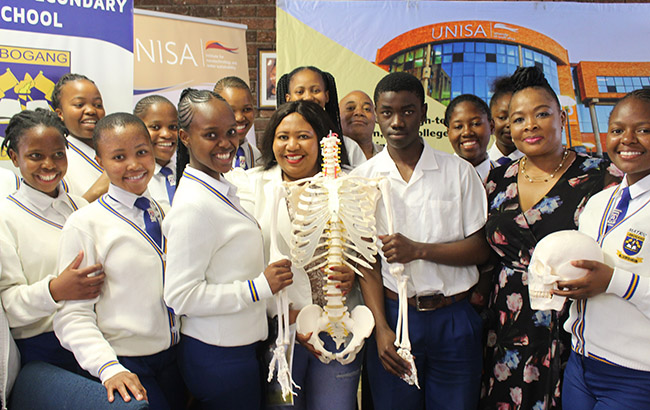News & Events
Unisa’s first Innovation Festival shows significant strides taken as an entrepreneurial university
Innovation at Unisa is no longer in its infancy. The growing maturity and influence of the university’s innovation drive were plain to see at the first Unisa Innovation Festival.
Held at the main campus in Pretoria, it was hosted by the Directorate of Innovation, Technology Transfer and Commercialisation to showcase Unisa’s innovation initiatives and gain insights into the latest trends in the broader South African innovation landscape.

From the left (back): Prof Moeketsi Letseka (Unisa's UNESCO Chair on Open Distance Learning), Prof Les Labuschagne (Unisa's Executive Director: Department Research, Innovation and Commercialisation), Dr Audrey Elizabeth Verhaeghe (Chairperson: Innovation Summit), Patrick Krappie (Acting CEO of the Technology Innovation Agency), Ruse Moleshe (Managing Director: RUBK (Pty) Ltd) and Ayanda Noma, (Unisa's Director: Directorate Innovation, Technology Transfer and Commercialisation)
From the left (front): Prof Thenjiwe Meyiwa (Unisa's Vice-Principal: Research, Postgraduate Studies, Innovation and Commercialisation) and Dr Phil Mjwara (Director-General of the national Department of Science and Innovation)
Some of South Africa’s top innovation leaders in the public sector were speakers or panellists at the festival, including Dr Phil Mjwara, Director-General of the national Department of Science and Innovation, Matsie Modise, Chairperson of the Board of the Technology Innovation Agency (TIA), and Patrick Krappie, TIA’s acting Chief Executive Officer.
In a wide-ranging address on the state of innovation in South Africa, Mjwara unveiled highlights of his department’s Decadal Plan on science, technology and innovation –formally adopted by the Cabinet of South Africa the day before the start of the Unisa Innovation Festival.
“So, the first time I am talking about this Decadal Plan is here at your Unisa campus,” he said, eliciting applause from an appreciative audience.
He noted that innovation priorities for the next ten years are to modernise agriculture, mining, manufacturing, health and energy, take advantage of new growth opportunities in the circular and digital economies, and tackle grand societal challenges such as climate change, the future of education and the future of work. “Universities have a crucial part in contributing solutions to these priorities, opportunities and challenges,” Mjwara said.
Experts consider bankability of Unisa inventions
Also participating in the festival were senior executives of leading funders of African start-up companies, who served on the panel of judges for The Crucible.
The Crucible was a pitching session in which eight Unisa innovators whose inventions are nearing market readiness explained what societal problems they seek to solve and what funding they still need before taking their inventions to market.
The role of the judges included assessing the potential “bankability” of the participants’ inventions – meaning how likely these are to succeed in the marketplace. According to the judges, the “most bankable pitch” was that of Mbuso Ngcongo, a BSc Computing student whose uMbalabala Education Toolkit is designed to help preschool children learn numeracy, literacy and coding skills.
Ngcongo was also the co-winner of the People’s Choice Award alongside Nkamogeleng Matloga, a BSc Biochemistry and Microbiology student who founded BCycle SA, which aims to create a “culture of mobility” in South Africa. The two received the most votes from the audience attending the festival, which was held in the Dr Miriam Makeba Concert Hall. Both of these start-ups are part of and supported by the DITTC Start-Up Academy.
This was the first time Unisa had invited outside experts to comment on the bankability and commercial prospects of its innovators’ inventions. “DITTC is hoping to continue with this initiative to create opportunities for commercialising Unisa innovations,” says Basanda Pongoma, DITTC’s Business Development Specialist, Start-up Academy.
Students withstand the heat of The Forge
Another must-watch highlight of the two-day festival was The Forge session, the final phase of the 2022 Innovation Challenge for Unisa students starting their journey to turn their innovative ideas into practical solutions to societal problems.
The judges chose three winners from The Forge pitching session: Noncedo Ngebulana, leader of the team whose ServeU project envisages a platform for connecting customers with artisans; Thokozani Pega, team leader of an animal and plant diagnostics project; and Lisa von Benecke, who aims to help solve the energy crisis by creating mobile solar blinds.
Each of the three winners qualifies for R100 000 seed funding to advance their innovations. “They will also join the Unisa DITTC Start-up Academy as the 2023 cohort,” said Basanda, meaning they will receive mentorship and training and assistance with prototype development and piloting.
“This was the 10th edition of the Innovation Challenge, which has grown in leaps and bounds to become one of the most eagerly awaited programmes among students interested in innovation and entrepreneurship,” he added.
Global partnership comes closer to home
Meanwhile, other vital sessions during the festival were two-panel discussions, one on how a university such as Unisa can act as a catalyst for local, regional and national socioeconomic development, and the other on how to build a university entrepreneurship/tech ecosystem that supports start-up and spinout companies.
The panel discussing entrepreneurship ecosystems included Professor Andre Moreni Lopes of the University of Campinas in Brazil, which is world famous for the success of its innovation and incubation programmes. Unisa is part of the University of Campinas’ global partnership programme.
Finally, as start-ups and spinouts are vital in the innovation value chain, the DITTC used the Innovation Festival to officially launch the Unisa Start-up Academy, which will train Unisa innovators – staff and students alike – to establish start-up or spinout companies.
The complete proceedings of both days of the Innovation Festival can be viewed on Unisa’s YouTube channel under the titles “Unisa Innovation Festival 2022 Day 1” and “Unisa Innovation Festival 2022 Day 2”.
* By Clairwyn Rapley, Directorate of Research Support
Publish date: 2023/03/14
